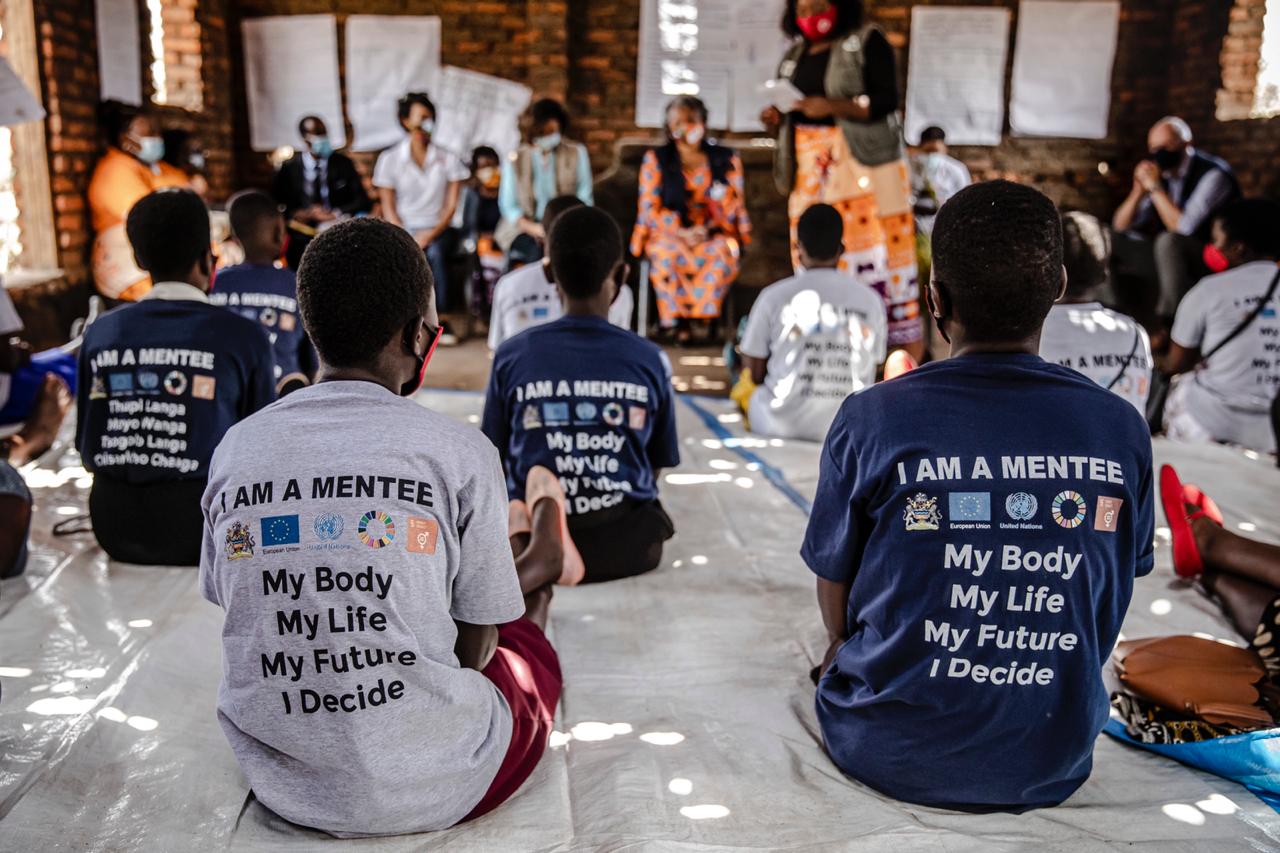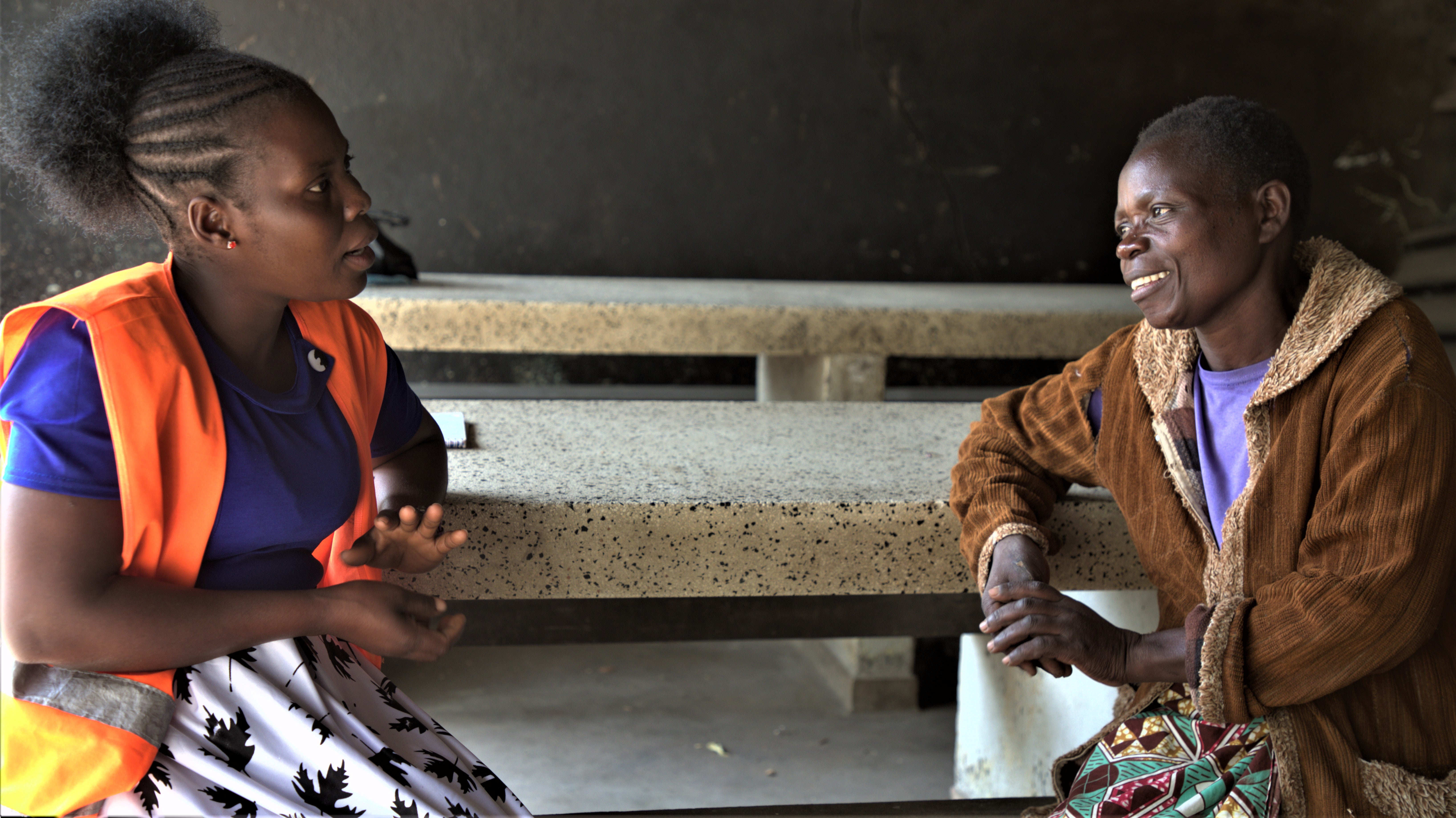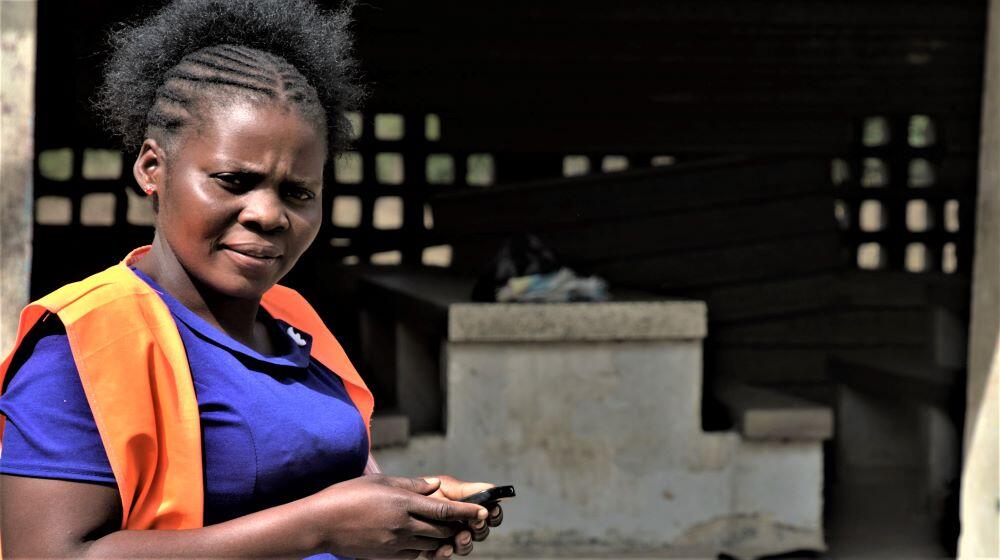Saving girls from early marriages
On this Friday afternoon, the safe space in Kalonjere village in Machinga, is bristling with activity as a group of girls’ chat animatedly discussing various topics. It’s been nine months since the safe space, aptly named Bright Future, was opened.
However, at the beginning, Bright Future safe space wasn’t such a beehive of activity. The girls- known as mentees, were either shy or not confident to speak up in a group. But the energy and the activity abound today show more than progressive.

Helping girls make informed decisions
Led by the United Nations Population Fund (UNFPA), the Safe Space Model forms part of activities under the Spotlight Initiative being implemented by the United Nations, the Government of Malawi, Civil Society Organizations (CSOs) and other partners, with support from the European Union (EU). The model aims to increase the capacity of mentors on safe space mentoring, for greater uptake of sexual and reproductive health and gender-based violence services.
Overseeing the girls at Bright Future safe space is mentor, Jessica Amali. During the session, she overhears one of the girls telling her colleagues about her friend who has dropped out of school to get married.
The girl, Charity* (13)- not her real name, is however, not part of the safe space. But Jessica is concerned. Any young girl in her community who drops out of school to get married, puts a dent on her work.
Fighting against child marriages
According to a report released last year by the Ministry of Gender, Machinga district recorded 969 cases of child marriages in 2020. The increase in cases of child marriages was largely caused by closure of schools as the number of people infected by the Covid-19 virus spiked. Many young people were rendered idle exposing them to risky health behaviours.
With the pandemic showing no signs of ending soon, the trend may continue. To Jessica, a passionate advocate for girl-child education, one case of child marriage is too many and she had to find out more about Charity from her friend from the safe space.
“I met the mentee who was narrating the story and learnt that Charity had dropped out of school while in class six,” says Jessica, adding, “And she was proudly telling her friends that she will be getting married soon.”
Buoyed by the fact that Charity had not yet moved into marriage, Jessica set out to meet the young girl.
“It was sheer luck that I overheard about the issue,” says Jessica. “And if it wasn’t for the safe space, I couldn’t have known of Charity, let alone her plans to drop out of school for marriage.”
Jessica managed to link up with Charity for counselling. At first, Charity seemed resolute to the idea of getting married. And she had her reasons.
Poverty forcing girls into early marriages
“My father passed on some time ago and my mother is struggling to take care of me and my five siblings,” said Charity in her defense. “Most of the time, I go to school without eating. I also have one uniform and when its dirty, I don’t go to school. So, I thought it’s better to drop out of school and get married.”
Her mother, Ms. Maria Biston, works as a general hand at one of the government’s offices, and was widowed four years ago. As a general hand, her salary isn’t enough and struggles to feed her six children.
Despite her struggles, Ms. Biston wanted to have her children educated to escape the poverty trap. When Jessica told her that her daughter had dropped out of school, she was devastated by the news.
“I normally leave early in the morning when the kids are sleeping and come back home late,” says Ms. Biston. “I have no other option but to sacrifice my family life to put food on the table. All this time, I thought she was going to school.”
With her blessing, Jessica continued counselling her daughter. By and by, Charity started seeing sense and finally ditched the idea of getting marriage to go back to school. The news made her mother ecstatic. Charity was her only hope since her elder sister had also dropped out of school and got married at 16.

Her life wasn’t better than the life she claimed to have escaped when staying at her mother’s house.
“It’s more of a sham marriage,” says Ms. Biston. “The husband doesn’t work and she is always begging me for financial support. I didn’t want Charity to end up this way.”
Now, Charity is back in school and according to her mother, she has changed a lot.
“Since meeting the mentor, Charity now loves her books,” she says. “Sometimes, I would come back from work and not find her home, but now, she is always home reading.”
Building a new generation of informed girls
In Machinga, the Spotlight Initiative is implemented in nine Traditional Authorities. The project has 133 mentors who have oversaw the graduation of 3524 mentees since the project started in 2019. So far, a new batch of 1500 mentees have been recruited into the safe spaces and more will join as the process is ongoing.
The Spotlight Initiative is built around six inter-connected and mutually-reinforcing pillars focusing on laws and policies, institutions, prevention and social norms, services, data, and the women’s rights movement – driving innovation and transformative programming to end violence. It targets Nkhata Bay, Mzimba, Ntchisi, Dowa, Machinga and Nsanje district.
*Charity is not her real name. The name has been changed to protect the girl’s identity.
Joseph Scott, Communications Analyst


